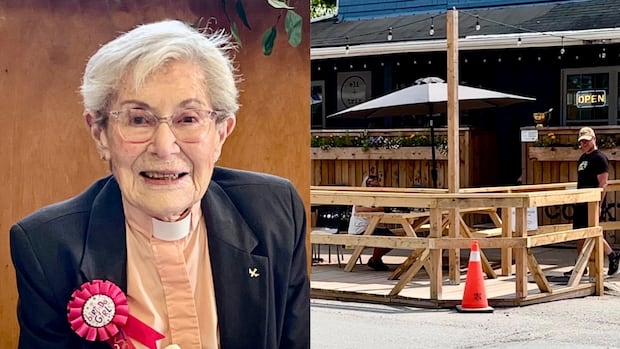Questionable police search gets a pass in N.S. probe that turned up pepper spray and cocaine

The police search of a sport utility vehicle that the driver put into the ditch on Highway 104 three summers back might not have been perfectly legal, but the Supreme Court of Nova Scotia’s going to let it slide anyway.
Mounties charged Nathan Butterfield with possession of cocaine for the purpose of trafficking and possession of pepper spray, a prohibited weapon, after the smell of cannabis in his rig made one officer suspicious enough to search the black Volkswagen and the area around the Aug. 15, 2020, crash site near Bible Hill.
Butterfield, 32, applied to the Supreme Court to exclude evidence seized on the day of his crash from his trial, arguing the RCMP officer had no authority to search his vehicle, and that evidence seized from the SUV was obtained in a manner that violated his rights protected by the Charter of Rights and Freedoms.
Butterfield also challenged a now-repealed section of the Nova Scotia Cannabis Control Act, which appeared to permit vehicle searches with no requirement that an investigator have reasonable belief, or even reasonable suspicion, that the law or regulations were being violated.
‘Technical breach’
“I have considered the well-presented arguments on each side. The position of the Crown is that the officer in this case cannot, by any reasonable measure, be viewed as having acted in a shocking or oppressive manner. While a technical breach may have occurred, it is not a scenario that would result in damage to the administration of justice,” Justice Jeffrey R. Hunt said in a written decision released Wednesday.
“In all the circumstances, I have concluded that the evidence ought not be excluded. On these particular facts, (Butterfield) has not carried his burden of establishing that the admission of the evidence would tend to bring the administration of justice into disrepute.”
The Crown opposed Butterfield’s application to exclude evidence.
‘Minor in nature’
“They argue that any search and seizure violation would be so minor in nature that the admission of the seized evidence would not bring the administration of justice into disrepute,” Hunt said.
Const. Gordon Carroll, a 15-year veteran of the RCMP, was dispatched to the crash site mid-afternoon.
“As he arrived at the scene, he saw that another officer, Constable Forthyse, had also just arrived,” said the judge.
Butterfield, who told the officers he’d been up much of the night and fell asleep at the wheel, passed a roadside alcohol screening test, Hunt said.
“Butterfield could not locate his driver’s licence, but believed it was in the vehicle.”
‘Gave consent’
Carroll testified that he asked Butterfield if he could search the Volkswagen for it. “He stated that Mr. Butterfield gave consent for him to look for the licence in the front of the vehicle.”
Outside the SUV, “he detected what he described as the strong odour of raw fresh marijuana,” said the judge.
“While looking around the passenger side of the vehicle he noticed, in the centre console area, what he took to be some sort of government approved container for the sale of cannabis.”
There was a burnt roach – the nub of a joint – inside, but the investigator didn’t think that was the source of the pot smell.
“During this search for the licence, the officer looked in the glove box where he saw a container which he identified and believed to be a prohibited pepper spray device.”
Butterfield arrested
Forsythe arrested Butterfield on the spot.
Carroll brought up the cannabis smell, but Butterfield denied smelling anything, Hunt said, noting he eventually produced the container with the roach in it and suggested that was the source of the stink.
Then Carroll asked Butterfield for permission to search the SUV “looking for the source of the strong smell he was detecting,” Hunt said. “Butterfield replied that he did not give consent and he proceeded to walk around the vehicle closing doors.”
Carroll contacted another senior Mountie, confirming his understanding that he had grounds under the Nova Scotia Cannabis Control Act to search Butterfield’s rig because the driver had ready access to the pot in the front seat.
‘Somewhere in the area’
Carroll’s search didn’t turn up anything.
“The officer testified that following this negative search he began to think about the period of time the driver had been alone on scene after the crash and before arrival of the police. He concluded that Mr. Butterfield would have had an opportunity to remove any items of contraband from the vehicle and place them somewhere in the area.”
Carroll walked around the Volkswagen, and found a small white coffee cup with a black lid in the grass about three metres away. “It appeared to him to be new and not weathered by exposure to the sun or elements. What stood out to him was that it appeared to be a match to a second cup with a lid that he had observed in the passenger seat area of the SUV.”
99 grams of cocaine
Inside the cup, Carroll found a clear pill bottle containing white powder “as well as what he described as a powdery white brick in a vacuum seal package,” said the judge.
“He believed that the substance would prove to be cocaine. He testified that subsequent analysis confirmed it to be approximately 99 grams of cocaine.”
Believing Butterfield put the cup in the grass, Carroll arrested him for possession of a controlled substance.
During another search of Butterfield’s SUV back at the RCMP detachment, police found a black kit bag in the trunk that contained a zippered pouch.
“Inside the pouch were found some zip-lock bags of marijuana, two black tetra-packs stamped THC, as well as a cellphone,” Hunt said, noting police did not have a warrant for this search.
Summary offence ticket
“A decision was subsequently made to issue a summary offence ticket to Mr. Butterfield with respect to the cannabis located in the trunk of the vehicle.”
While Butterfield originally sought the exclusion of the pepper spray and the cocaine, he later narrowed it to just the weapon. “The issue of possession of the cocaine will be contested at trial,” said the judge.
Neither the government nor the prosecution opted to defend the constitutionality of the section of the Nova Scotia Cannabis Control Act that governed searches.
“This is understandable,” Hunt said. “It was a flawed section that no longer exists.”
‘Claim was unsustainable’
The Crown initially took the position that Butterfield had consented to the search that turned up the pepper spray, said the judge. “It was eventually acknowledged by the Crown that this claim was unsustainable.”
The Crown conceded that the section of the Charter that guards against unreasonable search and seizure had been violated, Hunt said.
Carroll told the court that he wasn’t pursuing an investigation when he spied the pepper spray in Butterfield’s glove box.
The judge questioned whether the Mountie’s search of the front of the SUV and glove box outstripped Carroll’s authority.
‘Not legally sufficient’
“When testifying, the officer referred to having sought and obtained consent from Mr. Butterfield. This was also the initial position taken by the Crown in submissions. In subsequent submissions, the Crown conceded that any consent obtained here was not legally sufficient.”
Even after conceding that police didn’t have proper consent to search the SUV, the Crown argued the violation of Butterfield’s Charter rights was “at the low end of the spectrum,” Hunt said.
The judge concluded the initial search violated Butterfield’s Charter right to be free from unreasonable search and seizure. That “led to an arbitrary detention,” Hunt said.
‘Flawed’ process
“I accept the position of the Crown that the officer’s actions do not fall within a range of flagrant behavior that would demand strong denunciation. Taking a contextual view of the entirety of the interaction here, I conclude that the police decision making process, while flawed, was not at the severe end of the spectrum,” said the judge.
“This is not the clearest instance of police misconduct or malfeasance that would call out for condemnation by the court.”
While Butterfield’s rights “have been negatively impacted, these impacts do not fall at the extreme end of the spectrum,” said the judge. “This factor would only weakly to moderately favour exclusion.”
‘Weighs heavily’
Excluding the pepper spray as evidence would mean Butterfield couldn’t be convicted for possession of a prohibited weapon, Hunt said.
“In the circumstances of this case, this final factor weighs heavily against exclusion of the evidence.”
Butterfield’s trial is slated to continue Jan. 15 in Truro Supreme Court.
He does not have any previous convictions in Nova Scotia.



